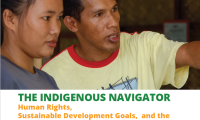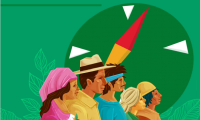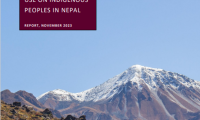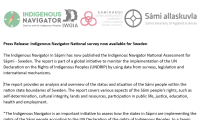Empowering Indigenous Voices: The Indigenous Navigator as a Catalyst for Rights and Development
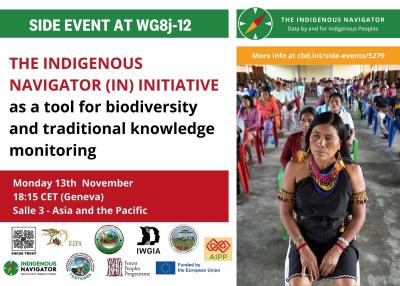
Location: Geneva/Global
On Monday, November 13, the Indigenous Navigator (IN), an initiative by and for Indigenous Peoples, organised an official side event in Geneva for the Working Group Meeting on Article 8j of the Convention on Biological Diversity.
Representatives from Africa, Asia, and the Americas took centre stage at this international gathering of Indigenous organizations and support groups and shared their experiences using the IN community monitoring framework and tools.
"One of the things that makes the Indigenous Navigator different from other research tools is that it is the indigenous peoples themselves are conducting the data [gathering], analysing the data, and actually storing the data within the community. This is one of the many advantages that the Indigenous Navigator brings, and it changes the entire landscape of research and data collection," said James Twala from ILEPA (Kenya)
Developed by and for Indigenous Peoples, the Indigenous Navigator is revolutionising the way Indigenous communities monitor their rights and engage in self-determined development through community-generated data.
The IN framework equips Indigenous communities with essential tools to monitor the implementation of critical international instruments, such as the UN Declaration on the Rights of Indigenous Peoples (UNDRIP), the ILO Indigenous and Tribal Peoples Convention, 1989 (No. 169), and the Sustainable Development Goals (SDGs).
“We have some very good examples of how the Indigenous Navigator has been useful to indigenous peoples, especially in addressing issues around the SDG 6 access to water,” shared Gideon Sanago from PINGOS Forum (Tanzania)
At the side event in Geneva, representatives of Indigenous communities and organisations from Kenya, Tanzania, Thailand and Malaysia discussed how they have utilized the IN framework to monitor territorial changes and generate data.
“In the case of the Maji moto group ranch, where there were land grabs within, the Indigenous Navigator provided the community an opportunity to do data analysis and collection, which was later presented in court as evidence.” - James Twala, ILEPA (Kenya)
These discussions also highlighted the IN's role in advocacy, policy influence, and supporting community-prioritized development projects.
“The Indigenous Navigator has opened space for dialogue between indigenous peoples and the government, and we use this space to build capacity two-way. We as Indigenous peoples need capacity, but there is also a lot of capacity gaps within the government, because of which we end up being victims,” said Anne Samante from MPIDO (Kenya)
“The Indigenous Navigator is a powerful framework that enables us to bring information to the [Thai] Parliament, so they see what happens at the community level, highlighting the importance of SDG4 education for all," said Mee Nittaya from IMPECT (Thailand)
Overall, the event highlighted the integral and critical role of the Indigenous Navigator’s framework in documenting and addressing critical gaps in the implementation and realisation of Indigenous Peoples rights and their integral role in sustainable development.
For more information about the Indigenous Navigator initiative and its impacts, please visit Indigenousnavigator.org.
For any questions regarding this press release, please contact xilo@fpp.org .
Data for Advocacy and Visibility:
The International Work Group for Indigenous Affairs joined the event to provide an overview of the aggregated Global data from 175 published community surveys and 18 published National Surveys. The data clearly revealed patterns of rights violations related to land, culture, and to the right to participation. The data serves as a powerful tool for evidence based advocacy. The IN has proven crucial in visualizing gaps in the implementation of Indigenous Peoples’ rights and facilitating dialogue between Indigenous communities and key stakeholders.
Key Benefits of the Indigenous Navigator:
- Making the SDGs work for Indigenous Peoples by providing relevant and actionable data.
- Empowering Indigenous communities to plan sustainable development and strategic advocacy.
- Offering an alternative narrative to official data, enhancing accountability.
- Illuminating gaps in the implementation of Indigenous Peoples’ rights.
- Fostering dialogue and exchange of best practices among Indigenous communities, governments, and international actors.
---
*End of Press Release*
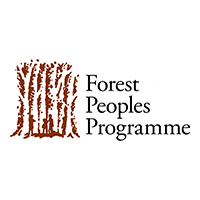
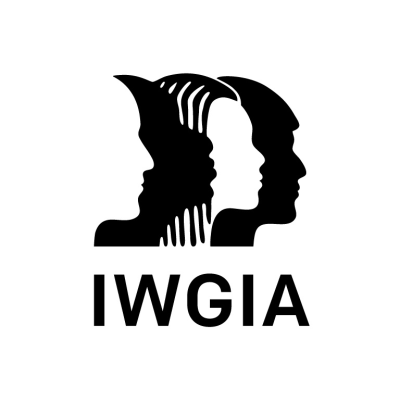
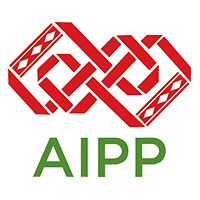
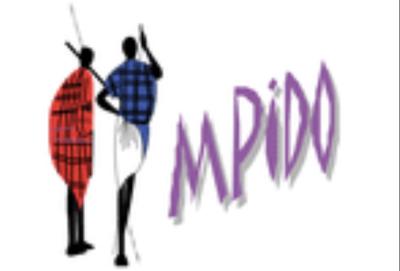
Mainyoito Pastoralists Integrated Development Organization (MPIDO)
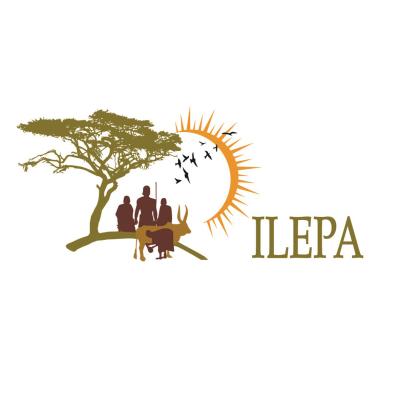
Contact


